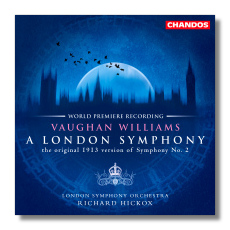
The Internet's Premier Classical Music Source
Related Links
- Vaughan Williams Reviews
- Latest Reviews
- More Reviews
-
By Composer
-
Collections
DVD & Blu-ray
Books
Concert Reviews
Articles/Interviews
Software
Audio
Search Amazon
Recommended Links
Site News
 CD Review
CD Review
Ralph Vaughan Williams

Symphony #2 "London"
(Original 1913 version)
- Symphony #2 "London" (1913)
- George Butterworth: The Banks of Green Willow
London Symphony Orchestra/Richard Hickox
Chandos CHAN9902 68m DDD
Also released on Hybrid Multichannel SACD CHSA5012:
Amazon
- UK
- Germany
- Canada
- France
- Japan
- ArkivMusic
- CD Universe
Summary for the Busy Executive: One of the most important releases of British music in the past five years.
Vaughan Williams composed his first purely orchestral symphony (he had already written the choral "Sea Symphony") in 1913 at the instigation of the younger composer George Butterworth. He then spent about twenty years tinkering with it, publishing the final revision in the mid-Thirties. Vaughan Williams revised eagerly and ruthlessly. He wanted to put the best of himself out there and therefore wanted to know his faults. He was adamant about his revisions. The final form superseded any earlier version. Generally speaking, he knew what he wanted as well as when he hadn't gotten it. I consider him a brilliant editor of his own stuff. I got an inkling of exactly how brilliant when EMI released the 1949 recording of Boult conducting the Symphony #6 with the original version of the scherzo (EMI CDH763308-2). There's nothing wrong with the original scherzo, if that's all you know, but the revision lifts the entire symphony to a new level of achievement. What seemed interesting is now downright exciting.
However, the revisions to the "London" Symphony are far more extensive. This CD restores roughly twenty minutes of music that hasn't been heard in probably sixty years. Because it's Vaughan Williams, it's good music, to boot. Not everyone liked the revisions. These included musicians of the caliber of Bernard Herrmann and R. O. Morris. One critic who had heard both versions wrote that one of the attractions of the original version was that "like the city itself," it wasn't too rigidly planned.
The original certainly impresses me that way. One feels as if one walks through the city and comes across something new as one turns the corner. However, there's also a greater melancholy, a spiritual lassitude, about the work. Vaughan Williams' revisions focus the symphonic argument, give the symphony a greater sense of forward motion and purpose. They concentrate the musical ideas. They remove weak ones – thoughts that were too easy and unworthy of the movements as a whole (I think especially of the second trio in the original scherzo). For me, the composer left out nothing essential. Nevertheless, I find myself longing for the original version of the "Epilogue," that musical evocation of the Thames at night winding to the sea, inspired by Wells's Tono-Bungay:
Light after light goes down. England and the Kingdom, Britain and the Empire, the old prides and the old devotions, glide abeam, astern, sink down upon the horizon, pass – pass. The river passes – London passes, England passes…
The revision of the epilogue runs several pages shorter than the original, full of beautiful music, which extends and strengthens (as opposed to dilutes) the final version. As I say, it's the only passage I miss. Young composers and Vaughan Williams headbangers like me should listen to both versions of the symphony. This look into the workshop fascinates and shows that, far from the bumbling amateur he was painted, Vaughan Williams knew exactly what his music was about.
Butterworth's Banks of Green Willow typifies his output. People said of Butterworth that no man was worse at making a friend or better at keeping one. He was blunt and even angry. I met an old priest in New Orleans who actually knew him at university and who told me that on the occasion of their first encounter, Butterworth hardly said a word and scowled at him the whole time. Butterworth fell under the influence of Vaughan Williams and the folk-song movement. He was killed, shot through the head, during World War I. In his brief life, he wrote songs and short orchestral pieces, of which The Banks of Green Willow counts as my favorite. Almost every one of his works shows a tender, lyrical nature and a great degree of artistic assurance. The opening to The Banks manages to say a lot in a very few notes. You wonder how his music might have developed had he lived and whether he would have done something other than exquisite miniatures.
Hickox does a beautiful job with the Butterworth and a very good one with the Vaughan Williams. I still prefer Barbirolli (EMD Classics Imports 65109) and Boult (EMI 64018) for the London Symphony as warmer and more penetrating. However, Hickox and his orchestra achieve a luminosity of texture and in the "Epilogue," at least, match the insight of the older recordings. The sound is excellent.
Copyright © 2001, Steve Schwartz




















